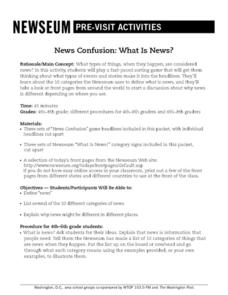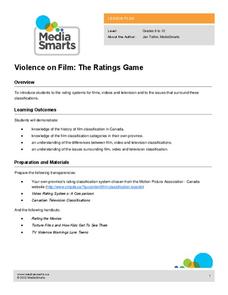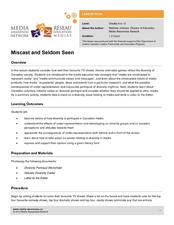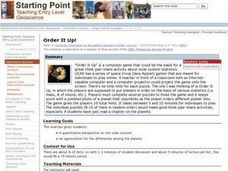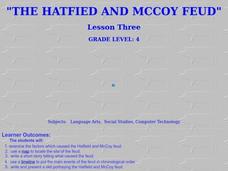The New York Times
Collateral Damage? Researching a Connection Between Video Games and Violence
Hook your class into an exploration of and discussion about violence in video games with a cute animal clip and a video game trailer. After a quick discussion about how media can affect mood, class members read a related article and...
Happy Moose Apps
Bitsboard - Education, Games, and Flashcards for Learning Reading, Spelling, and more
Learn everything from sight words to French vocabulary with this versatile study app. While the material that comes pre-loaded on the app is mostly based on learning how to read and spell, the app has the potential to be useful for any...
Curated OER
Making Choices
Second graders explore financial decision making. In this introductory economics lesson, 2nd graders listen to the book Alexander, Who Used to be Rich Last Sunday by Judith Viorst, and discuss making financial choices based on wants and...
Curated OER
Diversity in Media: Looking Critically at What We See
This learning experience fosters awareness of representations we see, and don't see, in the media. Learners list TV programs, games, and films they enjoy, identify characters' ethnic, religious, (dis)ability, and sexual orientation...
Curated OER
Dewey Decimal Game
Engage all the upper elementary classes in your school in a game to learn Dewey Decimal Classification. On 5 or 6 consecutive visits to the library, teams from each class learn how the system works, locate books in each category, and...
Newseum
News Confusion: What Is News?
Use headlines to help your learners understand what news is. First, present a list of categories to your class. Then instruct small groups to play a game in which they sort headlines into the categories. Discuss the result and examine...
Facebook
Introduction to Privacy
Sharing may be caring, but how much is too much? Young digital citizens ponder personal information during a activity from a module about privacy and reputation. Individuals take a survey, then mingle with classmates in a privacy game...
Media Smarts
Violence on Film: The Ratings Game
Learn about film and TV ratings systems in Canada (includes a comparison to the MPAA system) and how they influence appropriate viewing for youths. A detailed commentary about the film Seven pointed at revealing flaws in ratings systems...
Curated OER
Miscast and Seldom Seen
Consider how well students' favorite TV shows, movies and video games reflect the diversity of society. The lesson introduces your class to several media literacy concepts, such as how media conveys values and messages, as well as the...
Media Education Lab
Propaganda in Context
"Board Game Helps Fight Real World Ebola," a video produced by Voice of America, provides the text for a guided instructional activity that asks viewers to analyze the propaganda techniques used in the video. Groups then select a example...
Curated OER
Technology that Makes Phonics Fun
Students discover the Internet by participating in on-line educational activities. In this educational technology lesson, students utilize interactive story books, podcasts, and games to help expand an understanding of phonics....
iCivics
NewsFeed Defenders
How can people learn to spot viral deception? Players do just that with the NewsFeed Defenders media literacy game. Scholars choose avatars and the focus of their news feeds: student life, health and wellness, or sports and...
Curated OER
Learning New Words
Students, working in groups, make as many words as possible in a given time, using flash cards that contain prefixes, words, and definitions. They chose group roles and participate in a numbers of time rounds of this activities.
Curated OER
Jeopardy Game
Pupils review terms and concepts related to the class through games. They play a jeopardy style game to review concepts realted to the class.
Facebook
Privacy and You
The stuff I share goes where? Social media scholars discover how sites collect and use metadata during a lesson about privacy and reputation. The activity demonstrates smart privacy settings and promotes good digital citizenship.
Anti-Defamation League
Is Olympic Coverage Sexist?
Women Olympians have come a long way since 1900 when 22 women competed for the first time. News coverage of the Olympics has also changed dramatically. What has been slow to change, however, is the language used in the coverage of female...
The New York Times
Dark Materials: Reflecting on Dystopian Themes in Young Adult Literature
The Hunger Games. Maximum Ride. Why is so much of young adult literature so dark? What is the appeal of dystopian literature to young readers? The six activities in this resource ask kids to reflect on some of the reasons this genre has...
Curated OER
Thesaurus Forage
Looking for a game that teaches students about how to use a thesaurus, and reinforces the concept of synonyms? Each player will have the opportunity to use their "tools" in this engaging lesson. They will use their thesauruses in order...
Curated OER
TechKnow Genius!
Students utilize PowerPoint to create a game based on the television game show "Who Wants to Be a Millionaire." They research information about a particular area of study and identify the most important facts about the subject to create...
Curated OER
Order It Up!
Students use the game "Order It Up" an activity about the solar system statistics. The teacher is in the front of a classroom with an Internet-capable computer and a computer projector projecting the game onto the screen. Students have...
Curated OER
Hate 2.0
Combat hate online by bringing it into the light. Begin by giving learners a quiz, then lead a discussion based on the issues the quiz brought up. As a class, develop strategies to confront online hate. Assign different venues to groups...
Curated OER
The Hatfield and McCoy Feud
Fourth graders investigate the Hatfield and McCoy feud. For this Hatfield and McCoy feud lesson, 4th graders examine factors that caused the feud. Students also locate on a map where the feud took place, make a timeline of the main...
Curated OER
Cyberbullying and Civic Participation
Encourage your class to create rules and regulations for cyberbullying. Learners explore civic participation by thinking about the rules and regulations already in place in their lives and studying Canada's Canada Gazette. As a final...
Ontario
Computer Hardware —Computer Studies
What kind of components are needed for a computer? Through a differentiated lesson, individuals learn about six hardware computer components. They conduct research to determine the range of options for the components. Class members...





